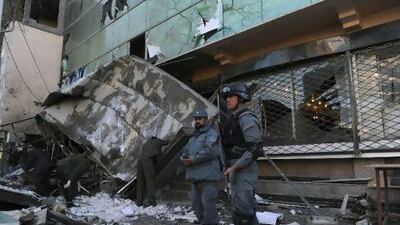KABUL // It was a typically quiet, weekend afternoon in Kabul, with slow-moving traffic clogging the city's muddy streets and young Kabulis loitering and chatting outside glitzy shopping malls.
Suddenly, the calm was shattered by rumours that a suicide bomber was loose in the capital.
As word of an imminent attack spread from street to street and neighbourhood to neighbourhood, drivers lept from their vehicles and fled on foot. Security guards at a local bank shouted at customers to take cover, scrambled to lock the doors and waved their guns wildly towards the street.
The report turned out to be a false alarm. Kabul's police spokesman later said the man police identified as a suicide bomber was actually a beggar. Still, the episode offered a glimpse into the fear that has become as much part of living in the capital as breathing its smoggy air.
A rise on attacks on civilian targets is gnawing at the nerves of Kabul residents. Since January, at least 15 civilians have died in suicide bombings in the capital, against 50 civilians, foreign soldiers and Afghan troops combined in the first six years of the war, according to a list of major attacks compiled by the Associated Press. Nearly 100 civilians have been killed in attacks across the country since the beginning of 2011.
Afghans say they have changed the way they move about Kabul, avoiding roads close to shopping districts, major banks and other locations frequented by foreigners, as well as adjusting the hours they do business in the city.
Police checkpoints have sprung up where only months ago there were none. Afghans say it feels like their capital is no longer a sanctuary from the storm that afflicts many other areas of the country; rather, it is now part of the swirling tempest, too.
Some Afghan refugees, many of whom spent most of their lives in either Pakistan or Iran, but returned to Kabul to rebuild, are now weighing the risks of staying in the city. Others are already searching for a way out.
"These attacks, they are happening all the time now in Kabul," said Zmaray, 28, a Afghan taxi driver who grew up in Pakistan but returned home in 2002. "Now, all of a sudden, we can't go to this area of Kabul, or maybe we will be attacked in another one. For us, nowhere is safe."
The international humanitarian aid effort is also deeply affected by the prospect of violence.
Oxfam International, the International Committee of the Red Cross and other aid organisations have imposed severe restrictions on the movement of their employees. A number of restaurants, bars, supermarkets and shopping districts once considered safe are now "completely off-limits" for aid workers, said Louise Hancock, Oxfam International's press officer in Afghanistan.
Residing inside fortified, walled compounds, the thousands of aid workers and other expatriates sense the world closing in on them. With Taliban-led insurgents now able to carry out co-ordinated attacks on United Nations facilities and the guesthouses where foreigners live, they know they are unlikely to escape the rising tide of attacks.
"In 2010, it was still possible, as a foreigner, to trick oneself into believing Kabul was a bubble of security, and the war was happening somewhere beyond," one female foreign aid worker, who wished to remain anonymous, said.
"Now, the war is undeniably here, on our doorsteps. Afghans have felt that for a long time, but the expat feeling of insulation is definitely gone now."
Behind the escalating violence in the capital is the growing confidence and military capability of the Islamist insurgents fighting the government of President Hamid Karzai. Once Kabul is robbed of its safety, Afghans say, it is unlikely the Afghan government will recover.
"The Taliban are now displaying publicly their brutality by attacking purely civilian targets and then taking responsibility," said Nader Nadery, the commissioner at the Kabul-based Afghan Independent Commission for Human Rights. "This has created a high level of anger among Afghans, but also a lot of fear. Nobody knows how dangerous Kabul will become."
Military experts say insurgents are most likely bringing the war to Kabul in an attempt to undermine the authority of the Afghan government before the deadline in July 2011 deadline for the withdrawal of some foreign troops. The government cannot weather a capital that has been robbed of safety, they say.
A US military adviser, who wished to remain anonymous, said: "Insurgents have their eye on Kabul. There's no doubt about that. Our intel indicates an insurgent plan to encircle the capital and eventually attack it in a major way. It's not a matter of if but when Kabul will become one of the war's key battlegrounds."
foreign.desk@thenational.ae
